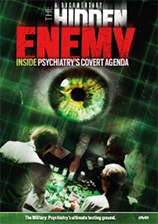 Study shows 400% increase in psychotic episodes for children taking ADHD drugs
Study shows 400% increase in psychotic episodes for children taking ADHD drugs
By Kelly Patricia O’Meara
Published by CCHR International
The Mental Health Industry Watchdog
September 21, 2016
In light of growing studies exposing the serious risks associated with ADHD drugs, the Citizens Commission on Human Rights cautions parents to arm themselves with the facts about the documented risks of the drugs currently being prescribed to over 4.4 million children and adolescents in the U.S. alone.
Adding to dozens of international drug regulatory warnings citing documented side effects of heart problems, seizures, anxiety and drug dependence, a study published in the medical journal Pediatrics, backs up the 9 drug agency warnings on ADHD drugs inducing psychosis. The latest study conducted on 141 children, found children on ADHD drugs were over 300% more likely to experience psychotic symptoms.
Psychotic symptoms are defined as:
- Hallucinations: the child perceives something that doesn’t exist in reality.
- Delusions: an unshakable belief in something implausible, bizarre or obviously untrue.
- Confused and disturbed thoughts: rapid and constant speech, random speech and sudden loss in train of thought, resulting in an abrupt pause in conversation or activity.
- Lack of insight and self-awareness: Unaware their behavior is in any way strange or that the delusions or hallucinations are not real.
ADHD drugs such as Ritalin (methylphenidate) and Adderall (amphetamine and dextroamphetamine) to name a few, referred to as “kiddie cocaine,” have long been known to cause a host of adverse events like hallucinations, abnormal behavior and aggression, cardiac problems, abnormal thoughts, sudden outbursts and mood swings.
And the addictive nature of ADHD treatments forces the Drug Enforcement Administration (DEA) to include Ritalin and Adderall as Schedule II drugs along with cocaine, as they are substances or chemicals defined as “drugs with a high potential for abuse, with use potentially leading to severe psychological or physical dependence.”
Despite these warnings, more than 4,400,000 American children, including 188,899 0-5 year olds, have been prescribed these admittedly dangerous mind-altering drugs. In fact, ADHD has become the most commonly diagnosed childhood psychiatric “disorder” with an estimated 5.8 million children having received the diagnosis.[5] The actual breakdown of ADHD drugging among America’s children, provided by IMS Health Vector One National database for 2013, is astounding.
- 0-1 years 1,422
- 2-3 years 10,413
- 4-5 years 181,023
- 6-12 years 2,723,126
- 13-17 years 1,775,896
The reason so many children are being prescribed ADHD drugs is due to the completely subjective nature of the diagnosis. Any child can fit the criteria for “ADHD,” as there are no medical tests, such as blood work, X-rays, CAT or MRI tests that identify any abnormality. Rather, the psychiatric industry has determined that meeting a random number of subjective behavioral criteria merit the “disorder” label, including:
- often fails to give close attention to details or makes careless mistakes in schoolwork work or other activities,
- often has difficulty sustaining attention in tasks or play activities,
- often does not seem to listen when spoken to directly,
- is often easily distracted by extraneous stimuli, and
- is often “on the go” or often acts as if “driven by a motor.”
Given the extremely large, and ever-increasing, number of infants and toddlers being diagnosed with ADHD and then prescribed stimulant “treatments,” one must seriously wonder how 0-5 year olds would not meet these criteria?
Taking into consideration the most recent study, one also must have legitimate concerns about the psychiatric industry’s understanding of the drug-induced psychosis. Because of the very subjective nature of psychiatric diagnosing, one also must wonder if the children experiencing a drug-induced psychotic episode will further be diagnosed with an additional disorder, such as bi-polar or even schizophrenia?
This is no small issue. Failure on the part of the medical community and psychiatric industry to identify the drug-induced psychosis most certainly will lead to additional subjective diagnosing and drugging, resulting in an endless cycle of chemical assault on the child’s developing brain.
While long suspected to be a rare occurrence among children taking ADHD drugs, according to this new study, psychotic symptoms actually occur much more frequently, leaving one to seriously question not only the ADHD diagnosis but, more importantly, why children are needlessly subjected to serious side effects, for simply acting like children.
 Today, with militaries of the world awash in psychiatry and psychiatric drugs, 23 soldiers and veterans are committing suicide every day. Psychiatrists say we need more psychiatry.
Today, with militaries of the world awash in psychiatry and psychiatric drugs, 23 soldiers and veterans are committing suicide every day. Psychiatrists say we need more psychiatry. It is psychiatry’s Diagnostic and Statistical Manual of Mental Disorders, and it is the engine that drives a $330 billion psychiatric industry.
It is psychiatry’s Diagnostic and Statistical Manual of Mental Disorders, and it is the engine that drives a $330 billion psychiatric industry. Psychiatrists claim their drugs are safe for children?
Psychiatrists claim their drugs are safe for children?
Speak Your Mind